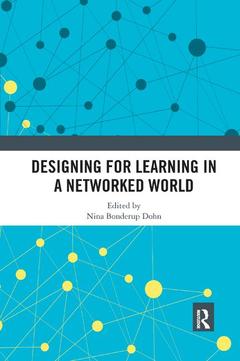Designing for Learning in a Networked World Routledge Research in Education Series
Coordonnateur : Bonderup Dohn Nina

Designing for Learning in a Networked World provides answers to the following questions: what skills are required for living in a networked world; how can educators design for learning these skills and what role can and should networked learning play in a networked world? It discusses central theoretical concepts and draws on current debates about competences necessary to thrive in contemporary society. The book presents detailed analyses of skills needed and investigates the question of how one can design for learning in specific empirical cases, ranging in academic level from preschool to university teaching.
The book clarifies the different conceptions of design within the educational field and offers a framework for thinking critically about instances of networked learning. It analyses digital and Computational Literacy and discusses participatory skills for learning in a networked world. Examples of specific empirical cases include teaching programming to students not necessarily intrinsically motivated to learn; facilitation of a participatory public in the library and designs for children?s transition from day-care to primary school, discussed as a matter of networked contexts.
Engaging thoughtfully with the question of ?21st century skills?, this book will be vital reading to scholars, researchers and students within the fields of education, networked learning, learning technology and the learning sciences, digital literacy, design for learning, and library studies.
Part 1. Common framework
Chapter 1. Introduction: competence demands in today's networked world
Chapter 2. Design in educational research – clarifying conceptions and presuppositions
Chapter 3. Networked learning in a networked world
Chapter 4. Assessing network technologies for learning
Part 2. Skills for a networked world
Chapter 5. Teaching in a networked world – skills, knowledge and beliefs
Chapter 6. Participatory skills for learning in a networked world
Chapter 7. Facilitating participation: Redefinition of library competence in a networked world
Chapter 8. Digital literacy – cognitive strategies, genre skills and situated practice
Chapter 9. Computational Literacy skill set – an incremental approach
Part 3. Case studies: designing for developing skills in a networked world
Chapter 10. Guided tinkering as a design for learning programming
Chapter 11. Designing for transition from day-care to school
Chapter 12. Design principles for designing simulated social practices
Chapter 13. Guidance practices for citizens’ interactions with e-government solutions
Chapter 14. Intermediaries and intermediating tools as instruments for digital literacy in Bangladesh
Chapter 15. Conclusion: designing for learning in a networked world
Nina Bonderup Dohn is Associate Professor in the Department of Design and Communication at the University of Southern Denmark.
Date de parution : 10-2019
15.6x23.4 cm
Disponible chez l'éditeur (délai d'approvisionnement : 14 jours).
Prix indicatif 53,83 €
Ajouter au panierDate de parution : 03-2018
15.6x23.4 cm
Thèmes de Designing for Learning in a Networked World :
Mots-clés :
Reflexive Self-perception; Informed Opinion Formation; Networked world; E-government Solutions; networked learning; Digital Literacy; design for learning; Field Facilitators; technology; Computational Thinking Skills; Computational Participation; literacy; contemporary society; Learning Designs; skills; Participatory Skills; social practice; Activity Internal Level; Nina Bonderup Dohn; Guidance Sessions; Jens Jørgen Hansen; Competence Demands; Stig Børsen Hansen; Library Staff; Lea Tilde Rosenlund; Requirement Characteristics; Roland Hachmann; ICT Skill; Bo Skøtt; Informal Communicative Settings; Rocio Chongtay; Anne Bjerre; Facilitate Student Activities; Ane Bjerre Odgaard; Danish Public Libraries; Margrethe Hansen Møller; Introductory ICT; Farzana Akther; Computational Thinking; Expansive Learning; ICT Centre; De Laat


